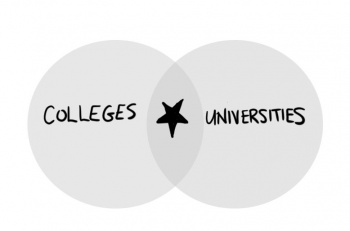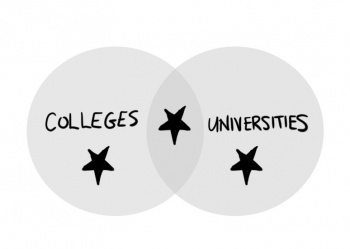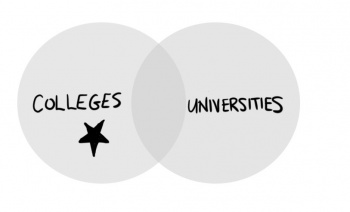EXTAFR100/EXTAFR103/A Savvy Search System/A review of limiters
| “ | The best thing about a boolean is even if you are wrong, you are only off by a bit. | ” |
| —Author unknown | ||
Here is a quick review of how to use limiters or Boolean operators. Learning how to use limiters — or Boolean operators — can save you a lot of search time. Boolean operators are the words “AND,” “OR,” and “NOT.” They are small words with a lot of search power!
For example, suppose we are attempting a basic search to find information on learner motivation at post-secondary institutions. We identify “colleges” and “universities” as our basic search terms.
If we search for “colleges AND universities”, our results must include both terms. The starred overlapping area in the graphic below depicts the results:
If we search for “colleges OR universities”, our results change, with the stars now in both overlapping and separate areas:
And if we choose to narrow our search to “colleges NOT universities”, the results are different again:
So,
- Using “AND” narrows the results as both terms must be present; there is more precision in our search.
- Using “OR” expands the results, as only one term must be present; we have less precision, but we are also less likely to miss an important resource
- Using “NOT” excludes a term completely; we should use this with care as we might miss an important resource.
This three-minute video “Boolean Operators - Science” (B. D. Owen Library, July 2015) provides examples of conducting searches:
If, like the majority of the world, you use Google as your primary search engine and want to dig deeper into building your search skills, consider the self-paced courses offered through “Power Searching with Google”
Take this short quiz to review how Boolean operators work:
H5P Object Parameters
The H5P parameters below will be replaced by the actual H5P object when it's rendered on the WordPress site to which it's been snapshotted.
Take Google out for a test drive using your new skills. See how your results change when you apply the following variables:
- Put quotes around a term (“ ”) to force a phrase search (i.e. return results only where the words in the phrase are together)
- Use “OR” to expand your search to include synonyms (term 1 OR term 2 OR term 3)
- Use “AND” to narrow your search (term 1 AND term 2 AND term 3, which gives results that include all three terms)
Now you are ready to explore the various curation tools and repositories using your refreshed search skills. Remember:
- pay close attention to your search terms;
- don't assume a repository does not contain information about your subject if the results are minimal; try searching again using another term or word to describe your subject area;
- don't forget to use your Boolean operators!






